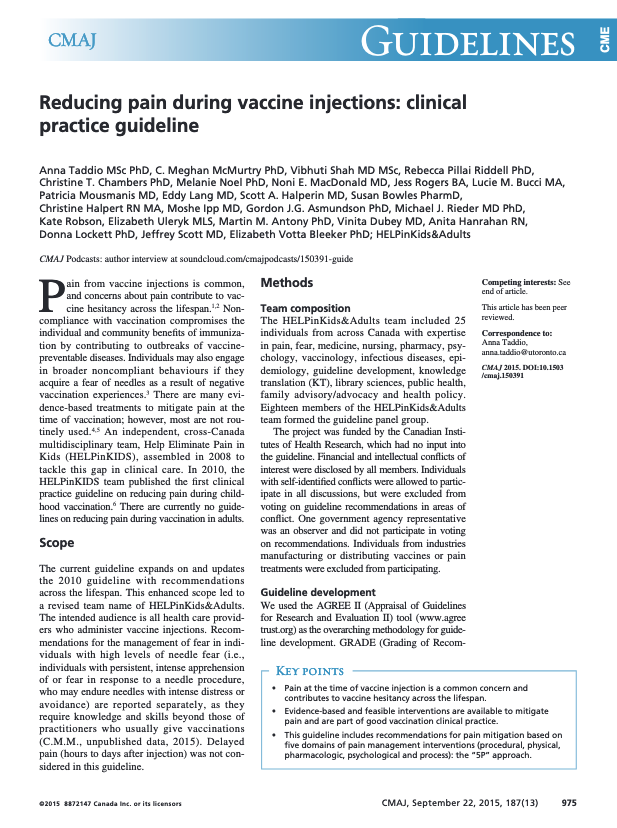Clinical Practice Guidelines
Supplemental Information to our 2015 and 2016 Guidelines:
Taddio A. Setting the stage for improved practices during vaccine injections: A knowledge synthesis of interventions for the management of pain and fear. Clin J Pain 2015; Link
McMurtry CM, Pillai Riddell R, Taddio A, Racine N, Asmundson GJG, Noel M, Chambers CT, Shah V, HELPinKids&Adults Team. Far from “just a poke”: common painful needle procedures and the development of needle fear. Clin J Pain 2015; Link
Taddio A, McMurtry CM, Shah V, Yoon E, Uleryk E, Pillai Riddell P, Lang E, Noel M, Chamber CT, Noel M, MacDonald NE, HELPinKids&Adults Team. Methodology for knowledge synthesis of the management of vaccination pain and needle fear. Clin J Pain 2015; Link
Taddio A, Shah V, McMurtry CM, MacDonald NE, Ipp M, Pillai Riddell R, Noel M, Chambers CT, HELPinKids&Adults Team. Procedural and physical interventions for vaccine injections: systematic review of randomized controlled trials and quasi-randomized controlled trials. Clin J Pain 2015; Link
Shah V, Taddio A, McMurtry M, Halperin SA, Noel M, Pillai Riddell R, Chambers CT, HELPinKids&Adults Team. Pharmacological and combined interventions to reduce vaccine injection pain in children and adults: systematic review and meta-analysis. Clin J Pain 2015. Link
Pillai Riddell R, Taddio A, McMurtry CM, Chambers CT, Shah V, Noel M, and HELPinKIDS&Adults Team. Psychological Interventions for Vaccine Injections in Young Children 0 to 3 Years: Systematic Review of Randomized Controlled Trials and Quasi-Randomized Controlled Trials. Clin J Pain 2015; Link
Birnie KA, Chambers CT, Taddio A, McMurtry CM, Noel M, Pillai Riddell R, Shah V, HELPinKids&Adults Team. Psychological interventions for vaccine injections in children and adolescents: systematic review of randomized and quasi-randomized controlled trials. Clin J Pain 2015. Link
Boerner KE, Birnie KA, Chambers CT, Taddio A, McMurtry CM, Noel M, Shah V, Pillai Riddell R, HELPinKIDS&Adults Team. Simple psychological interventions for reducing pain from common needle procedures in adults: systematic review of randomized and quasi-randomized controlled trials. Clin J Pain 2015; Link
Pillai Riddell R, Taddio A, McMurtry CM, Shah V, Noel M, Chambers CT, HELPinKids&Adults Team. Process interventions for vaccine injections: systematic review of randomized controlled trials and quasi-randomized controlled trials. Clin J Pain 2015; Link
McMurtry CM, Noel M, Taddio A, Antony MM, Asmundson GJG, Pillai Riddell R, Chamber CT, Shah V, HELPinKids&Adults Team. Interventions for individuals with high levels of needle fear: systematic review of randomized controlled trials and quasi randomized controlled trials. Clin J Pain 2015; Link
Noel M, Taddio A, McMurtry CM, Chambers CT, Pillai Riddell R, Shah V, HELPinKids&Adults Team. HELPinKids&Adults knowledge synthesis of the management of vaccination pain and high levels of needle fear: limitations of the evidence and recommendations for future research. Clin J Pain 2015; Link
Our Guidelines 2010:
2010 HELPinKIDS clinical practice guideline about reducing childhood vaccination pain and tools:
Reducing the pain of childhood vaccination: an evidence based clinical practice guideline (summary) - CMAJ article http://www.cmaj.ca/cgi/rapidpdf/cmaj.092048v1
Reducing the pain of childhood vaccination: an evidence-based clinical practice guideline - CMAJ article November, 2010
Reducing the pain of childhood vaccination: an evidence-based clinical practice guideline - CMAJ article, Appendix 1 Parent Tool
Reducing the pain of childhood vaccination: an evidence-based clinical practice guideline - CMAJ article, Appendix 2 Clinician tool
Reducing the pain of childhood vaccination: an evidence-based clinical practice guideline - CMAJ article, Appendix 3 Documentation tool
Supplement Issue of the journal Clinical Therapeutics was devoted to immunization pain, and includes articles from HELPinKIDS Team that summarize immunization pain and effective pain-relieving strategies. http://www.clinicaltherapeutics.com/article/S0149-2918(09)00263-X/abstract
Original Research
Organizations & Groups (utilizing our work)
Rourke Baby Record 2017
The Rourke Baby Record (or RBR for short) is a system that many Canadian doctors and other healthcare professionals use for well-baby and well-child visits for infants and children from 1 week to 5 years of age.
http://www.rourkebabyrecord.ca/pdf/RBR%202017%20National%20English%20-%20Black%20170926.pdf

Feasibility of implementation of CARD™ for school-based immunizations in Calgary, Alberta: a cluster trial.
Taddio A, Coldham J, Logeman C, McMurtry CM, Little C, Samborn T, Bucci LM, MacDonald NE, Shah V, Dribnenki C, Snider J, Stephens D. Feasibility of implementation of CARD™ for school-based immunizations in Calgary, Alberta: a cluster trial. BMC Public Health, 31 Jan 2021, 21(1):260. DOI: 10.1186/s12889-021-10247-4

Managing pain and fear: Playing your CARDs to improve the vaccination experience.
Taddio A, Ilersich A, McMurtry CM, Bucci LM, MacDonald NE. Managing pain and fear: Playing your CARDs to improve the vaccination experience. Can Commun Dis Rep 2021;47(1):87–91. https://doi.org/10.14745/ccdr.v47i01a12

Benchmarking public health pain management practices during school immunizations
Bucci LM, MacDonald NE, Freedman T, Taddio A. Benchmarking public health pain management practices during school immunizations. Can Commun Dis Rep 2020;46(10):367–72. https://doi.org/10.14745/ccdr.v46i10a10

The CARD™ System: A patient-centered care tool to ease pain and fear during school vaccinations
The CARD™ System was designed with input from all the relevant stakeholders involved in school-based vaccinations, including students, public health staff, school staff, and parents. A stepwise approach was used to identify needs and preferences, develop tools and resources, and evaluate the impact of implementation (6). In a controlled cluster trial, students in schools implementing CARD™ (vs. control) reported less fear (OR=0.47; 95% confidence interval [CI] 0.27 to 0.82) and dizziness (OR 0.26; 95% CI 0.07 to 0.91).

Exposure-based Interventions for the management of individuals with high levels of needle fear across the lifespan:
Needle fear typically begins in childhood and represents an important health-related issue across the lifespan. Individuals who are highly fearful of needles frequently avoid health care.

